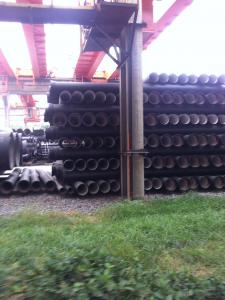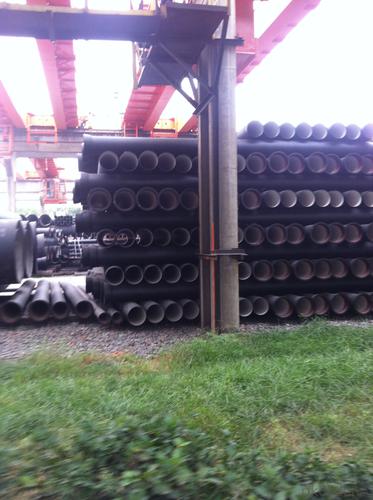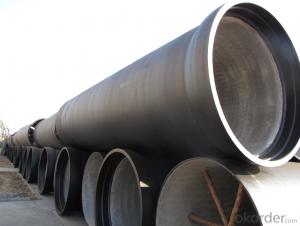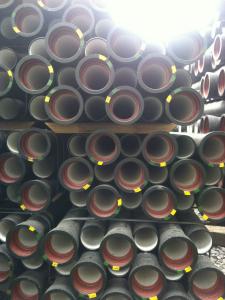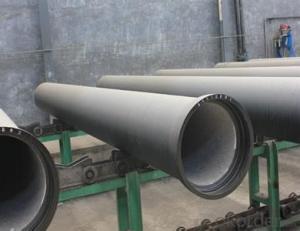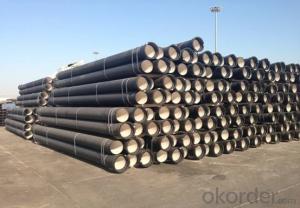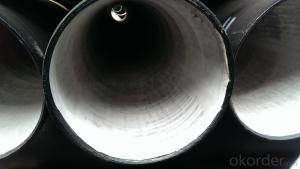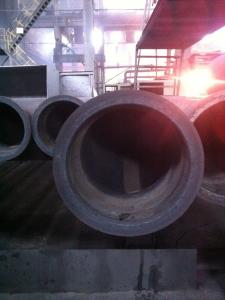DUCTILE IRON PIPES AND PIPE FITTINGS K9 CLASS DN1500
- Loading Port:
- Tianjin
- Payment Terms:
- TT OR LC
- Min Order Qty:
- 22 pc
- Supply Capability:
- 3000 pc/month
OKorder Service Pledge
OKorder Financial Service
You Might Also Like
Material : Ductile Cast Iron
Size Range : DN 80mm to DN 2000mm
Unit Effective Length : 6m or 5.7m
Manufacture Standard: ISO 2531:1998/ EN 545:2006/EN 598:2007
Annual capacity : 200,000 tons
Coating Exterior: Zinc 130g/m2 according to ISO 8179-1 and bitumen coating 70 microns.
Cement Interior: Portland Cement/ High Alumina Cement/ Sulphate Resisting Cement Lining according to ISO 4179
Special requirements on external coating and internal lining can be applied
We also provide accessories such as SBR/EPDM rubber gaskets, lubricant paste, pipe caps, PE sleeves, etc.
Additional Parts:
Each pipe is strictly inspected according to related standard to ensure permanently high performance.
Easy Installation at site and service free for life
Long Service Lifespan
Quotation will arrive you within 24hours once we get your inquiry.
We guarantee offering you a competitive price.
A copy of original inspection reports of pipes will be offered after shipment.
Photos of loading process will be sent to the customer after shipment effect.
We will follow-up the delivery progress after shipment effect and update to the customer on weekly basis.
- Q: Are ductile iron pipes suitable for potable water distribution systems?
- Ductile iron pipes are well-suited for the distribution of drinking water in potable water systems. Ductile iron, a form of cast iron, is renowned for its strength and durability, making it an ideal choice for transporting drinking water. These pipes possess corrosion resistance, a crucial factor in preserving the safety and quality of potable water. Moreover, their smooth inner surface helps prevent the accumulation of sediments and biofilms that can negatively impact water quality. Furthermore, they can withstand high pressure and temperature fluctuations, rendering them suitable for diverse potable water distribution systems. In summary, ductile iron pipes are a dependable and widely employed solution for ensuring the provision of safe and uncontaminated drinking water to communities.
- Q: The role of chromium in nodular cast iron
- In the bending fatigue test of crankshaft, it is also found that the chromium containing cast nodular iron crankshaft has the characteristics of large ultimate bending moment, high safety factor, overload duration, high strength and small deformation.
- Q: Are ductile iron pipes suitable for irrigation systems in agricultural fields?
- Yes, ductile iron pipes are suitable for irrigation systems in agricultural fields. Ductile iron pipes have excellent strength, durability, and corrosion resistance, making them ideal for carrying water in irrigation systems. They can withstand high pressure and heavy loads, ensuring reliable water supply to agricultural fields for irrigation purposes.
- Q: Can ductile iron pipes be used in areas with high levels of hydrogen sulfide gas?
- Yes, ductile iron pipes can be used in areas with high levels of hydrogen sulfide gas. Ductile iron pipes have a high corrosion resistance, which makes them suitable for such environments. Additionally, they have been successfully used in sewage systems and wastewater treatment plants where hydrogen sulfide gas is commonly present.
- Q: Can ductile iron pipes be used in areas with high soil salinity?
- Indeed, areas with high soil salinity can accommodate the use of ductile iron pipes. These pipes possess notable resistance to corrosion, rendering them compatible with different soil conditions, even those with elevated salinity levels. Usually, these pipes are coated with a safeguarding layer, such as polyethylene or zinc, which bolsters their capacity to ward off corrosion caused by saltwater or saline soils. Furthermore, employing appropriate installation methods, such as meticulous backfilling and soil compaction around the pipes, can effectively mitigate the potential consequences of high soil salinity on the durability and effectiveness of ductile iron pipes.
- Q: Are ductile iron pipes suitable for acidic or alkaline environments?
- Yes, ductile iron pipes are suitable for both acidic and alkaline environments. They have excellent resistance to corrosion, making them a reliable choice for transporting fluids in a wide range of pH levels.
- Q: Can ductile iron pipes be used for submarine pipelines?
- Yes, ductile iron pipes can be used for submarine pipelines. Ductile iron is known for its high strength and durability, making it suitable for various applications, including underwater installations. Ductile iron pipes have been successfully used in the construction of submarine pipelines for several decades. They can withstand the harsh conditions of underwater environments, such as corrosion, pressure, and shifting seabed. Additionally, ductile iron pipes have excellent resistance to external loading, making them ideal for submarine pipelines that need to withstand the weight of water and potential impacts. However, it is important to consider factors such as coating, cathodic protection, and proper installation techniques to ensure the long-term performance and integrity of the submarine pipeline.
- Q: Can ductile iron pipes be used for underground cable conduits?
- Yes, ductile iron pipes can be used for underground cable conduits. Ductile iron pipes are known for their strength, durability, and corrosion resistance, making them suitable for various applications, including underground cable conduits. Their ability to withstand heavy loads and external pressures makes them a reliable choice for protecting and housing underground cables.
- Q: Ductile iron pipe is flexible pipe or rigid pipe
- Steel tubes, of course, because ductile iron pipes are not easily deformed.
- Q: How does ductile iron pipe handle ground movement and settlement?
- Ductile iron pipe is highly resilient and can effectively handle ground movement and settlement. Its flexibility and strength allow it to withstand external loads and pressure variations caused by ground shifts and settlement. The pipe's inherent ability to absorb and distribute stress ensures its stability, minimizing the risk of damage or failure due to ground movement. Additionally, ductile iron pipes are commonly installed with flexible joints that further accommodate ground shifts, providing a reliable and durable solution for underground applications.
Send your message to us
DUCTILE IRON PIPES AND PIPE FITTINGS K9 CLASS DN1500
- Loading Port:
- Tianjin
- Payment Terms:
- TT OR LC
- Min Order Qty:
- 22 pc
- Supply Capability:
- 3000 pc/month
OKorder Service Pledge
OKorder Financial Service
Similar products
Hot products
Hot Searches
Related keywords
